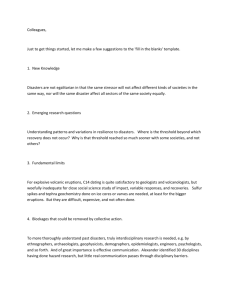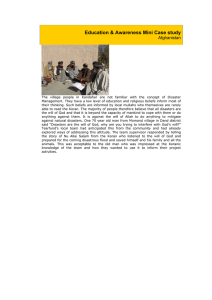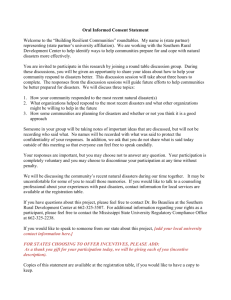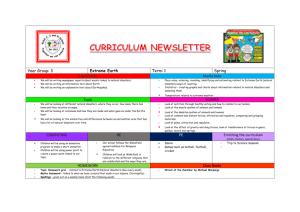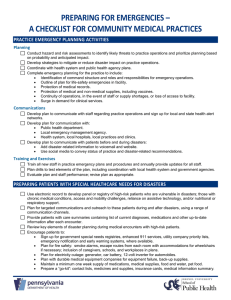– February 4t Exploratorium - January 25 , 2016
advertisement
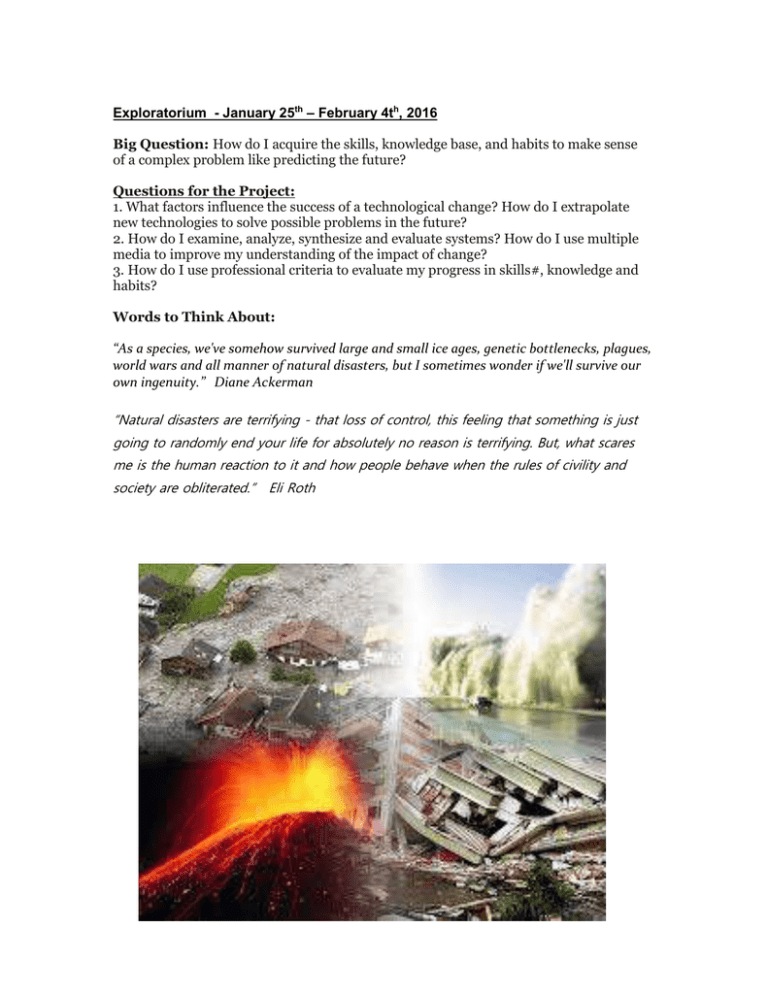
Exploratorium - January 25th – February 4th, 2016 Big Question: How do I acquire the skills, knowledge base, and habits to make sense of a complex problem like predicting the future? Questions for the Project: 1. What factors influence the success of a technological change? How do I extrapolate new technologies to solve possible problems in the future? 2. How do I examine, analyze, synthesize and evaluate systems? How do I use multiple media to improve my understanding of the impact of change? 3. How do I use professional criteria to evaluate my progress in skills#, knowledge and habits? Words to Think About: “As a species, we've somehow survived large and small ice ages, genetic bottlenecks, plagues, world wars and all manner of natural disasters, but I sometimes wonder if we'll survive our own ingenuity.” Diane Ackerman “Natural disasters are terrifying - that loss of control, this feeling that something is just going to randomly end your life for absolutely no reason is terrifying. But, what scares me is the human reaction to it and how people behave when the rules of civility and society are obliterated.” Eli Roth The Story So Far … Last week provided ample opportunities to ponder disasters. Blizzards and earthquakes presented themselves for study. According to Alan November*, the three skills students need to be successful include 1) dealing with massive amounts of information, 2) working collaboratively, and 3) being self-directed. Last week was Individual Endeavor week where students put these skills into practice. * November Learning And Now … We return to examining natural disasters and applying the six-step FPS process to this topic that is likely to impact our future. Note the skills # and assessment at the end of this document. We work on the skills#, knowledge base and habits required to complete this process. Calendar Items: 1. All Tremont paper work due Friday, January 29th. Please contact Mr. DeGuire or Ms. Sermos if you have a problem. a. Checks should be made payable to Wydown Middle School. b. If you are uncomfortable sharing an SSN#, please write SHRED on the top of the document. 2. All students wishing to compete for the Future Problem Solving State Bowl please contact Mr. DeGuire. The State Bowl is the same day as The Science Olympiad State Bowl – April 9th. 3. The Deadline for the Fluor Challenge is soon. 4. All contests and competitions are optional. The skills are taught in class and time is provided during Individual Endeavor weeks. 5. “Mini-Research Report” – “Technology into the Future” will continue next week if you haven’t presented yet. TASKS: 1. 2. 3. 4. Complete annotating your share of the background knowledge in your readings. Write at least 2 SIAS (Synthesizing#1) for your articles. Work with your team to complete “Into the Tempest” (Analyzing#2) Characteristics of Natural Disasters and the “Natural Disaster Blaster” (Structuring an Overview#3). Work with your Team to complete “This Booklet is a Disaster” 52-64. (“Critique and Modeling #4,5) RESOURCES: 1. 2. Readings: Natural Disasters Topic Activities: This Booklet... Structured Overview…, Topic Analysis …, FPS Process Packet (Anatomy of …), SIAS template, TED talks, Schoology, Research Websites, etc. As needed, example; transforming research, etc. 3. 4. SKILLS - January 2016 1. 2. 3. 4. 5. 6. Presenting a brief PPT presentation Taking notes on a presentation Reading for a purpose (Annotating article summaries) The Future Problem Solving Process Steps 1-6 SIAS (Summary in a Sentence) SCAMPER (Substitute, Combine, Adapt, Modify, Magnify, Minify, Put to Other Uses, Eliminate, Reverse, Rearrange) 7. Critique and evaluation of work 8. Keeping and transforming information for a purpose 9. Structured Overview 10. Time Management 11. Collaboration Professional Growth (WCATY) 1. Reading: Is able to make connections in text but is working on making connections between texts 2. Writing: Developing their style and ability to share unique ideas 3. Knowledge Base: Knows enough about the field to be able to connect ideas across pieces … 4. Meta-cognition: Knows what they don’t know 3 Skills 1. 2. 3. Deals with massive amounts of information Collaborates with a wide variety of people Is self-directed
